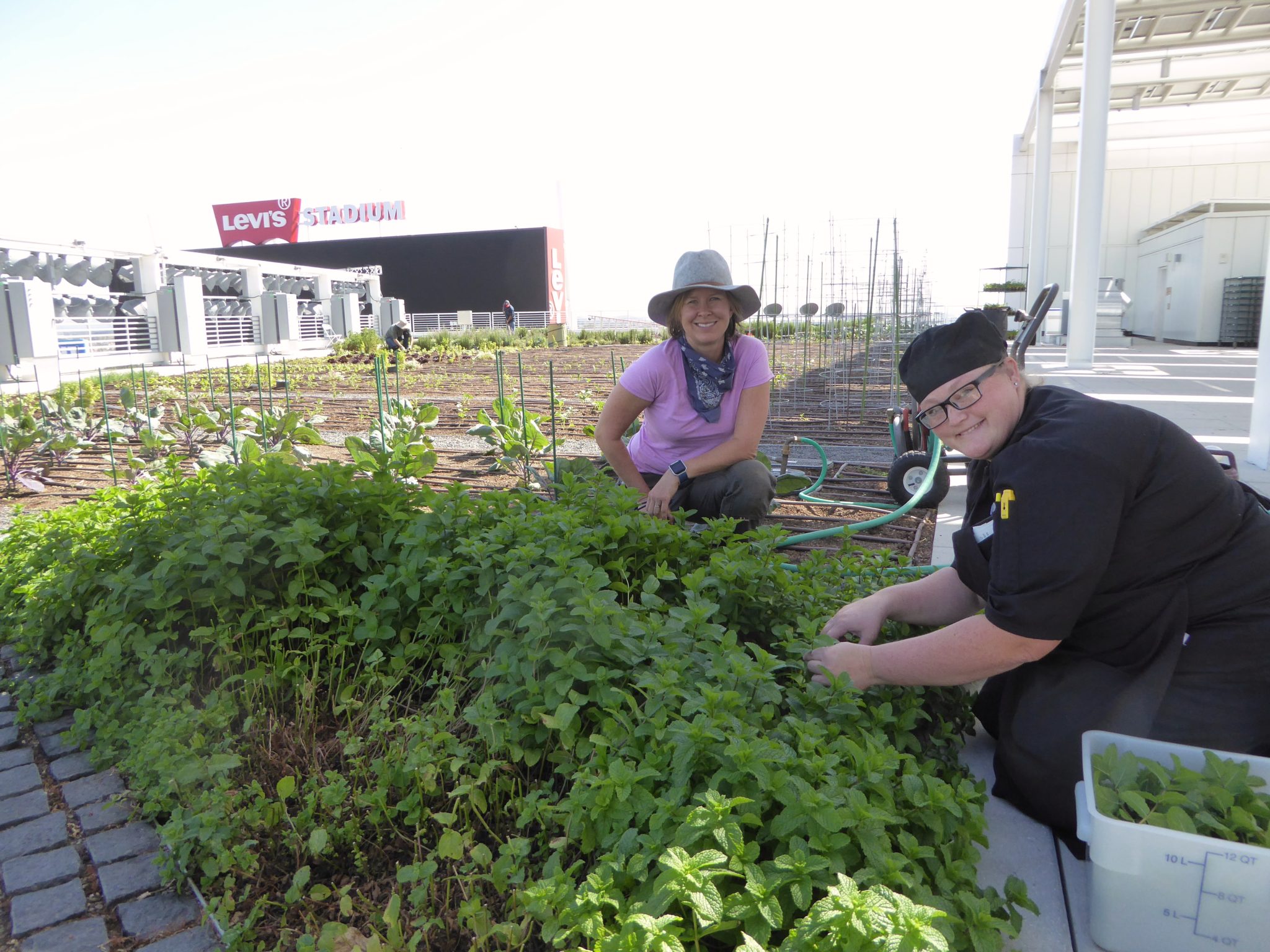

Nine stories up, atop the roof of the SAP Tower of Levi’s Stadium in Santa Clara, is a thriving 7,000-square-foot organic vegetable and herb garden now going on two years old. Called the Faithful Farm, it is located on the tower’s 27,000-square-foot NRG Solar Terrace, high above the scrambles and scrimmages of the San Francisco 49ers football team on the field below.
Established in July of 2016, the rooftop garden is a first for a National Football League (NFL) stadium. It was the inspiration of Danielle York, wife of 49ers CEO Jed York, who thought vegetables would be a tasty addition to the grasses and succulents already planted on the roof to help reduce heating and cooling requirements for the tower suites below.
“The garden wasn’t cheap, but it’s beyond that. It’s more about being a leader, a pioneer of sustainability. That means more to the York family than saving dollars,” said Jim Mercurio, 49ers Vice President of Stadium Operations and General Manager. “The York family gives us the resources to make a difference.”
Consider the logistics. Everything must be hauled up to the roof—soil, flats of plants, fertilizer, gardening tools, the drip watering system using reclaimed water—everything. Then once grown, the produce must be hauled down to the kitchen.
“We get everything more intensely up here. Wind rips things out. The sun is very intense without much shade, so the crops get nuked,” said Lara Hermanson, principal of Farmscape LLC, which manages the Faithful Farm and is the largest urban farming venture in California (www.farmscapegardens.com).
The farm is tended by three gardeners working three days a week. Annuals such as cabbage, broccoli, cauliflower, bok choy, kale, lettuce, pumpkins, edible flowers and fine-leafed herbs are part of the fall harvest. In all, about 40 different vegetables and herbs are rotated over the year.
“We plant off-beat varieties. The chef can get regular things,” said Hermanson. “We plant hard-to-source specialties, varieties you can’t find through traditional ordering.”
The farm, expanded from 4,000-square-feet, has yielded over 7,000 pounds of produce, and Hermanson works a month ahead with yield predictions. She creates weekly spread sheets for Executive Chef Dinari Brown of Centerplate, the stadium’s food hospitality partner, who plans menus around the produce available. Food that isn’t served in club spaces during games and at private events hosted at the stadium, is donated.
“I was shocked when I looked at tonnage and how fast things grow,” said Mercurio. “What an amazing kind of transformation.”
“You feel proud. The team feels as if we’re working with pioneers here, in some cases being pioneers,” said Mercurio. “We’re opening up possibilities to people in the industry.”
Indeed, other NFL stadiums are following suit in the growing trend for edible gardens tucked into unexpected urban places. Atlanta’s Mercedes-Benz Stadium, home to the Falcons, opened in August of this year with a street-level garden.
However, it was San Francisco’s AT&T Park, home to the Giants baseball team, that led the way as the first pro sports franchise with an edible garden. In June of 2014, raised boxes of vegetables (also tended by Farmscape) were installed behind the centerfield wall, just under the scoreboard.
LEED, standing for Leadership in Energy and Environmental Design, recognizes best-in-class building strategies and practices, and Levi’s Stadium prides itself on achieving LEED Gold certification in two categories.
It was the first NFL stadium to open—in August 2014—with LEED Gold certification for new construction. Then in 2016, it received LEED Gold certification for operations and maintenance of an existing building, making it the first NFL stadium to receive LEED Gold certifications from the U.S. Green Building Council in both categories.
And with the success of the Faithful Farm, Levi’s Stadium further LEEDs the way for the 49ers and the City of Santa Clara.
Sports and infrastructure will be Santa Clara’s focus over the next year. At the Santa…
With the World Cup and Super Bowl coming to Santa Clara’s Levi’s Stadium next year,…
Rest vs rust; it’s a classic sports debate. When there is a break in the…
Right or wrong, agree or disagree, common sense or no sense, if your thinking matches up…
Friday afternoon’s baseball matchup between the Wilcox Chargers and Milpitas Trojans was pretty much decided…
Super Bowl preparations are coming together, with the city manager saying the final agreements will…